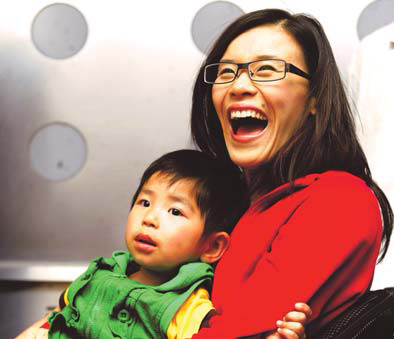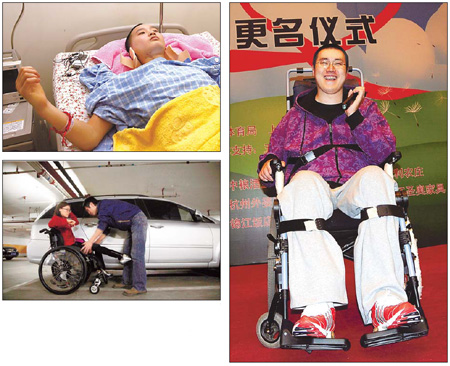Focus
Sang seeks her day in US court
Updated: 2011-06-16 07:49
By Hu Yongqi (China Daily)
|
|
Chinese gymnast Sang Lan, who was paralyzed at the 1998 Goodwill Games in New York, will depart for the US on June 29 to settle an insurance dispute over her medical expenses.
Her lawyers say they have reached an agreement with TIG Insurance Co, which underwrote coverage for all athletes at the games, including $10 million for Sang.
TIG paid medical bills only for treatment Sang received in the US. Now it has agreed to also cover her treatment on the Chinese mainland, Sang's lawyers said.
Sang filed a lawsuit against TIG in April, saying its refusal to pay the bills "merely because she does not live in the US ... creates inequality based on nationality for (a) disabled person". Her complaint sought $100 million from the company.
Sang is scheduled to meet TIG managers on July 14 in New York.
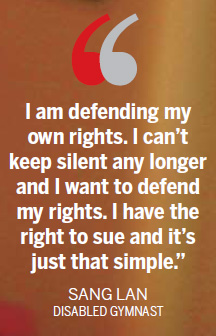 |
The insurance dispute is only part of Sang's complaint, asking compensation totaling $1.8 billion, that brought three people and five institutions to the US District Court for the Southern District of New York on April 28.
The compensation amounts to $100 million for each of the 18 claims, which include breach of an agreement; violations of various federal, state and city laws; insurance violations; defamation; and negligence.
In her suit, Sang named three people and five institutions as defendants. They include media mogul Ted Turner, who founded the Goodwill Games; the former AOL Time Warner Inc; the US Gymnastics Federation; TIG; Riverstone Claims Management; and two legal guardians who were appointed to look after Sang following the accident.
People sent malicious messages to Sang on the Internet, said Hai Ming, head of Sang's nine lawyers in New York. "Some of them claimed (they would) kidnap her at the airport in New York or kill her." Last month, Sang's lawyers amended the lawsuit to add 17 people who threatened her online.
"Now Sang's personal security also becomes one of our priorities, and we will hire up to 10 bodyguards to protect her in case of potential dangers on her way to the court or meeting with insurance company managers," Hai said.
'Defending my rights'

Controversy has swirled around Sang because two of the defendants were her legal guardians during 10 months of treatment and rehabilitation in the United States. Previously, their relationship was portrayed as one of a daughter and parents.
Chinese-Americans Liu Guosheng and his wife, Xie Xiaohong, were appointed by the Chinese Gymnastics Association. Xie was vice-president of the association in 1998 and was the main sponsor of China's gymnastics team.
Hai said the couple were "in control of her medical treatments and connections with American doctors. The two people used Sang's name and image in their business without permission. And they also invaded Sang's privacy."
Sang, because she was only 17 then, was unable to shoulder any civil or criminal responsibilities. Her guardians should have taken on those obligations, including fighting for her insurance coverage, said Lu Yiguang, a lawyer who specializes in medical disputes with Kangxin Law Firm in Shanghai. "However, they did not."
Defendant Liu said on his blog last month that they "never did one single thing to go against Sang" and everything they did "can be put to test before the law and time".
Netizens have posted mix comments about the case. Some accused Sang of being "ungrateful for the couple's help"; others have supported her legal action against anyone she thought had violated her interest.
"I am defending my own rights," Sang told Xinhua News Agency in May. "I can't keep silent any longer and I want to defend my rights. I have the right to sue and it's just that simple."
"Sang does have rights to sue" but she waited too long, said Raymond Wong, president of Wong, Wong & Associates, one of the biggest Chinese-American law firms in New York.
The time limit in New York for filing suit is one year for inflicted injury and six years for breach of contract, Wong said. That would rule out litigation of 17 of the 18 complaints in Sang's suit, he said.
Her attorney Hai said it might be late after 13 years, "but better than never".
"It seems very hard to find good compensation for her (Sang), and a good choice is to negotiate with the insurance company to cover her medical bills," Wong told China Daily.
Seeking independence
Sang Lan started to train in gymnastics when she was 6 and had won one national championship before her accident at age 17. She retired from China's national gymnastics team in 1999 but continued to receive treatment at China Rehabilitation Center in Beijing. The center, in an exception to its usual practice, provided her a 50-square-meter apartment with two bedrooms.
Then and now, Sang cannot take care of herself: She cannot wash or dress herself, cannot get chopsticks to eat.
Her father, Sang Shisheng, 50, came to the capital to take care of the teenager people called the "smiling angel" after he quit his housing management job at home in Ningbo, Zhejiang province.
Three years ago, Sang Lan asked her parents to return home because she thought she must be able to live independently. She graduated in journalism from Peking University and became an ambassador of Beijing in its bid for the Olympic Games in 2008. She worked as a special correspondent for the Beijing Olympic Games' website.
However, her efforts could not guarantee her a secure life. Medical care is a huge financial burden. A nanny in Beijing costs at least 2,700 yuan a month. Rehabilitation costs at least 3,000 yuan a month if Sang follows her doctor's advice to train every day.
After the accident, Sang was compensated with 200,000 yuan each by the State Administration of Sports and the Sports Department of Zhejiang province. She receives 1,600 yuan in salary and 600 yuan specifically for nursing from Zhejiang's sports department. Sang has earned an extra 2,800 yuan each month by writing books, making guest appearances on TV series, working as a hostess and shooting commercials.
China's system
Law professors said her case shows how vulnerable athletes are when they are badly injured or disabled. What matters more in this case, they said, is the difficulty of winning compensation due to litigation time limits, particularly overseas, and flaws in China's system to guarantee a secure life for retired athletes who were badly injured.
China has about 50,000 active registered athletes, China Central Television reported in May. More than 10,000 retire each year, CCTV said, and more than 70 percent of them have been injured or disabled. Thousands are struggling with medical care and a good life.
Jin Shan, director of the Sports Culture Research Center at the Beijing Academy of Social Sciences, said governmental subsidies, commercial insurance and charity funds should work together to meet financial needs of injured and disabled athletes.
In China's transition to a market economy, Jin said, commercial insurance should play a bigger role in providing subsidies to support injured athletes.
"If Sang Lan was insured before going to the Goodwill Games, the insurance dispute would never take place," said Yan Xufeng, professor of sports law at Beijing Sport University and a member of the Chinese Society of Sports Law.
Yan said sports insurance is supposed to cover unexpected injuries of Chinese athletes and sports games hosted in China. "Though yet to be improved, China's sports insurance has made much progress for the last decade."
During the "two sessions" of 1995, 11 members of the Chinese People's Political Consultative Conference proposed that disability and injury insurance be provided for elite athletes. The next year, Albert Hung Chao Hong, president of the South China Sports Association in Hong Kong, donated 12 million yuan ($1.84 million) to the China Sports Foundation as a special insurance fund for athletes.
In 1997, the personnel and finance departments of the General Administration of Sport of China (GASC) coordinated with funds for injured athletes to be distributed to the China Sports Foundation. A year later after Sang's accident, 1 million yuan was given to the foundation by the government.
Expanding program
Meanwhile, GASC issued regulations that defined 10 levels of disability that would be used to determine compensation. From 1998 to 2002, more than 1,400 elite registered athletes around the country received compensation, Yan said.
In September 2002, GASC began a pilot program of mutual insurance for injured and disabled athletes, although it did rule out surgical costs. Officials with the Sports Fund Management Center of GASC said the project charges much less than commercial insurance. Athletes each submit 40 to 100 yuan to build a fund, which should provide compensation to athletes a week to a month after injury, Yan said.
Athletes of national teams and provincial teams were included in the program originally. In 2004, athletes at city level and above also were insured, along with younger athletes in sports school who were training to compete in the Olympics and China's National Games.
Initially, compensation ranged upward from 3,000 yuan at the 10th damage level (meniscus damage, for example). As the number of covered athletes expanded and when a new level, 11, was added, the minimum compensation dropped to 1,000 yuan.
The maximum compensation for ordinary athletes was 200,000 yuan, but 600,000 yuan for Olympic champions if they were severely injured.
In 2004, China Sports Insurance Broker Co Ltd was registered, with fixed capital of 10 million yuan, to implement insurance policies for injured athletes.
About 25,000 athletes of 240 grassroots training units join the project each year, according to a report released by the Sports Fund Management Center last August.
Since 2002, more than 12,500 injured athletes have been compensated with a total of 33.31 million yuan. Ten families of athletes who died in contests were given 300,000 yuan each. Eight badly injured athletes were compensated with 200,000 yuan each.
Fewer than 10 sports insurance policies are available for injured athletes in China. About 80 percent of retired athletes with bad injuries have to struggle in hardship, according to Professor Yan.
"Compared with developed countries, especially the US and European Union, China's investment in sports insurance for professional athletes is not enough," Yan said.
Athletes also don't know enough about insurance, Yan said. He said most still think the government is responsible for insurance, as it was 30 years ago in the planned economy. In other countries, many athletes have their own insurance. For example, just-retired Brazilian soccer star Ronaldo insured his legs for $6 million.
Sang Lan's case reminds athletes who often go abroad to compete that they must know about local laws on compensation, lawyer Lu in Shanghai said.
"Sometimes sports officials shrink from claiming compensation for athletes because they think it's embarrassing to argue with hosts. Then athletes' justified rights to make claims are ignored," Lu said. "The mindset must be changed."
Chen Weihua in New York contributed to this report.
|
Top: Wang Yan, injured her neck at the 2007 national gymnastic championships when she was only 16. She is currently undergoing treatment. Above: Sang Lan arrives for an interview at the Workers' Gymnasium in Beijing last month. Right: Tang Miao, former international volleyball player, celebrated his 30th birthday in Shanghai last month. Tang broke his back while warming up before a friendly match against Russia in 2007. Provided to China Daily |
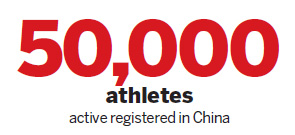
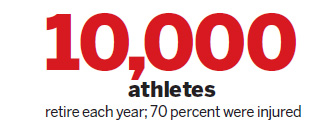
(China Daily 06/16/2011 page1)

Specials

Mom’s the word
Italian expat struggles with learning English and experiences the joys of motherhood again.

Big win
After winning her first major title, Chinese tennis star could be marketing ace for foreign brands

Markers of memories
Axe comes down on historical buildings as part of Harbin government’s baroque programs
